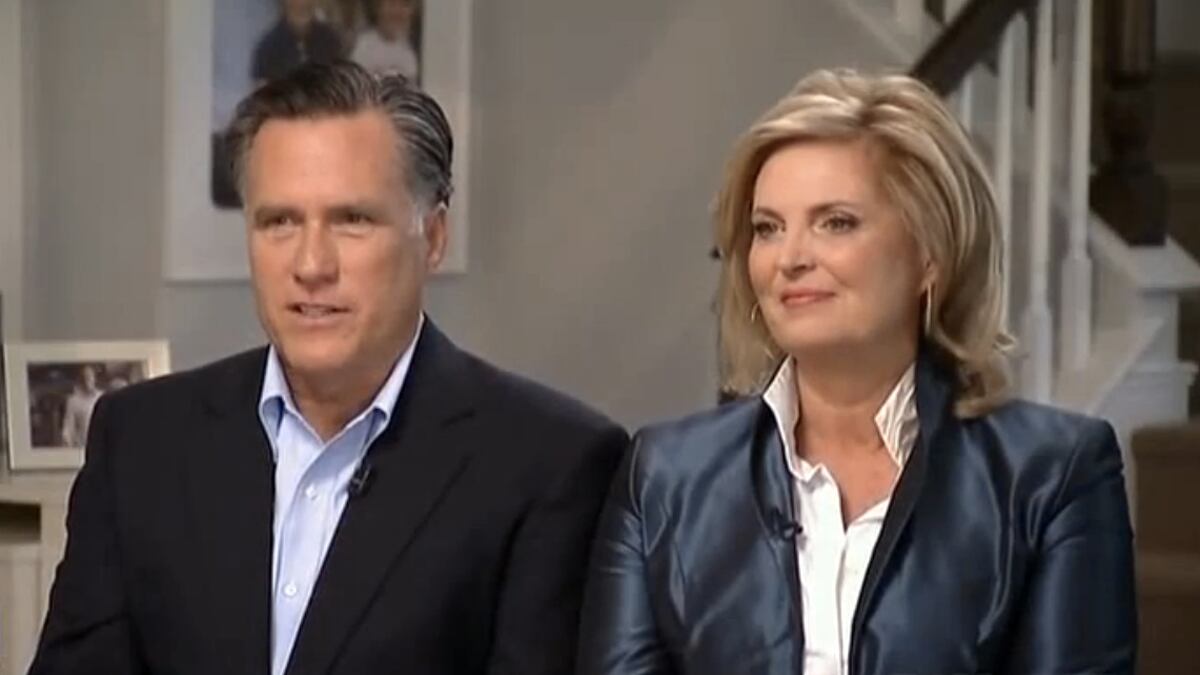There’s nothing easier than criticizing a guy who’s just lost the presidency, so before parsing Mitt Romney’s interview with Fox News Sunday, let me offer a few words of praise. There’s little question that Romney is personally decent. Like Barack Obama, but unlike many other leading politicians, Romney seems genuinely happier being with his wife and family than being in a room of political sycophants. In his Fox interview, he gave the impression of a man stomaching political defeat comparatively well, because, in Ann Romney’s words, “fortunately we like each other.” Romney’s decent, wholesome image was not enough to win him the presidency, but it dealt a blow to America’s hoary bigotry against Mormons, which is no small achievement.
But for all his rectitude and good humor, Romney still came across as a man who doesn’t understand why he lost. He claimed that as president he would have prevented the sequester, because as governor of Massachusetts he learned the art of bipartisan compromise. “You know, when I was elected governor of my state, I had a legislature 87 percent Democrat,” he told Chris Wallace. “It was not lost on me that to get anything done, I couldn’t be attacking them. I had to find ways to reach out to them.”
Not a bad message in an election where even Obama’s strongest defenders admitted that he had not fulfilled his promise of closing the red-blue divide. But when Wallace asked Romney to explain his pledge during a Republican primary debate that he would oppose a budget deal that included $10 in spending cuts for every $1 in tax hikes—a statement that helped devastate his credibility as the candidate of bipartisan compromise—Romney said he had had no choice. Had he endorsed the hypothetical $10–$1 deal, Romney explained, critics would “say Romney’s changed his position. He said he wouldn’t raise taxes; now he’s saying he will. He’s changed his position.”
In other words, Romney knew that his shift from moderate governor of Massachusetts to hard-right presidential candidate had left him vulnerable to charges of flip-flopping. So to avoid feeding that perception, he stuck with a cartoonishly right-wing position even though it helped eviscerate what might have been the most compelling rational for his candidacy. Despite this, Romney denied in the Fox interview that “the primary made me become more conservative than I was.” Has Romney forgotten that we were all there, watching the before-and-after split screens that revealed how radically his views had changed? Had Romney admitted that the ideological purity tests imposed by the primary process weakened him in the general election, he might have done reformers in his party some good. But he didn’t, either because he still doesn’t realize this elementary truth or because he remains too timid to say so.
Romney’s second “he still doesn’t get it” moment was when he explained his defeat by noting that “the president had the power of incumbency. Obamacare was very attractive, particularly to those without health insurance. And they came out in large numbers to vote.” The giveaway is the phrase “power of incumbency.” When people discuss the “power of incumbency” in a presidential election, they’re usually referring to a president’s ability to give himself an unfair advantage—for instance, by using patronage to woo politically influential constituents. But the Affordable Care Act was not that. It was the signature legislative achievement of a president and a party that had for decades considered universal health care a moral imperative.
For Romney, however, giving poor people health care represents “the power of incumbency.” Which is to say, it’s a political bribe. Romney said so more explicitly in a conference call with donors a week after the election in which he explained that Obama had used the “old playbook” of offering goodies to certain groups—“especially the African-American community, the Hispanic community, and young people”—to lure them to the polls. Romney, by contrast, had spent the campaign “talking about big issues for the whole country: military strategy, foreign policy, a strong economy, creating jobs, and so forth.”

Whether Romney realizes it or not, the implication is clear: white and old people put aside self-interest to think about what’s best “for the whole country.” Young, black, and brown people leech off the government and flock to the polls to reelect the black president who helps them do so.
“The weakness that our campaign and that I had is we weren’t effective in taking my message primarily to minority voters,” Romney told Wallace. You don’t say. Here’s a hint: if you want to woo African-Americans and Latinos effectively, stop claiming that they live off the government dole while rich white people live lives of Ayn Randian self-reliance. Start viewing them with a bit more respect and people like yourself with a bit less self-regard. Even today, Romney seems not to understand that, which helps explain why he didn’t win the presidency and didn’t deserve to.






